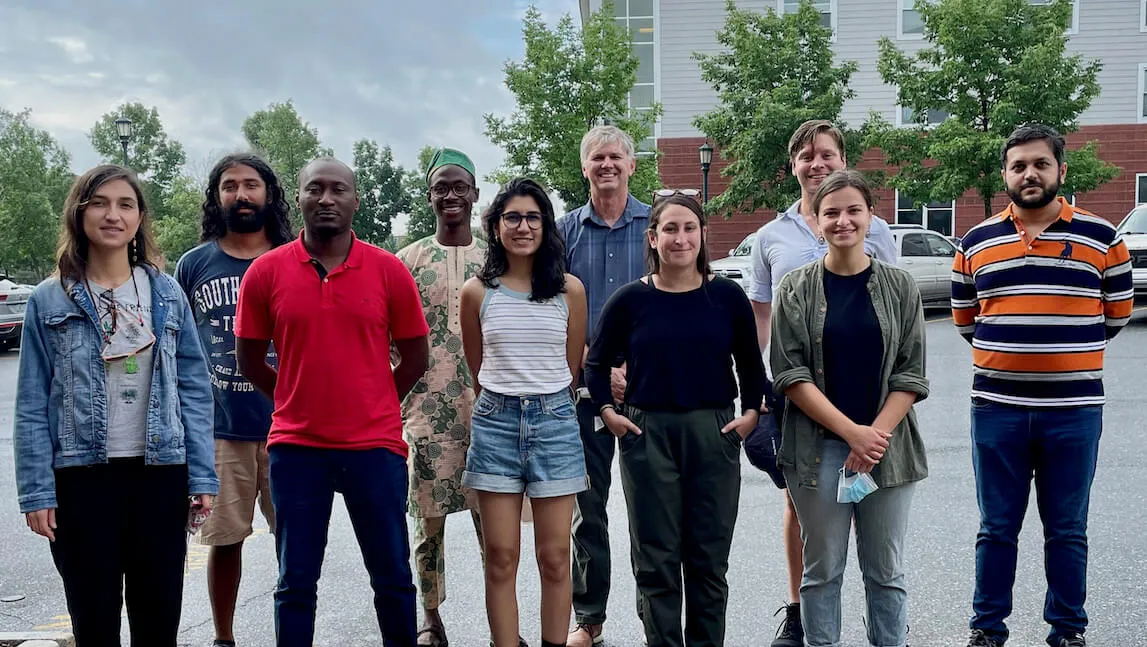The first cohort of students in UVM’s new doctoral program in Sustainable Development Policy, Economics and Governance has arrived on campus. Hailing from seven different countries, the 10 doctoral students will spend the next several years gaining skills to address sustainable development challenges in local, state, national and global communities.
Housed within the Department of Community Development and Applied Economics (CDAE) , the transdisciplinary program is comprised of 18 faculty members from three different colleges: College of Agriculture and Life Sciences, College of Arts and Sciences and College of Engineering and Mathematical Sciences. As the program grows, there will be more opportunities for faculty participation across campus, said CDAE Professor and Chair Jane Kolodinsky, who co-directs the program with Christopher Koliba, CDAE Professor and Faculty Director of UVM’s Office of Engagement.
More than 15 years in the making, the program prepares students to assume positions as policy leaders in government, higher education, public and private sector organizations, nongovernmental organizations and research institutes. The core curriculum includes applied policy and economic analysis, governance and process design, social science methods and professional skills development.
“We are proud to be able to offer this new program that leverages our faculty and research expertise across UVM in sustainability, social and behavioral economics, policy, climate science, ecological systems and community development,” said Kolodinsky. “We are especially excited about the breadth of skills and experiences in our new cohort and the impactful research they will produce during their time at UVM.”
The cohort includes a range of professionals who bring a wealth of experience to the program through previous roles with the United Nations, World Bank, Fulbright Association, Chemists Without Borders, AmeriCorps, as well as several country-based policy institutes and research universities. Their research interests span the United Nations’ 17 Sustainable Development Goals – an urgent call for action by all UN member states committed to working together to improve health and education, reduce inequality and spur economic growth while tackling climate change and preserving the world’s oceans and forests. Several students are receiving funding from UVM’s Gund Institute for Environment to pursue research in these areas, which align with the Institute’s core research themes.
Among them is SDPEG doctoral student Juliana Neira, who was drawn to the program for its transdisciplinary nature and intentional focus on rethinking some of the conventional constructs of development. Born and raised in Bogotá, Colombia, Neira earned a B.S. in Biology from Florida International University, an M.S. in Sociocultural Anthropology from the Autonomous University of Barcelona, and has taught integrated and environmental sciences at schools in Colombia, South Korea, Spain, Trinidad and Tobago and the U.S. In addition to continuing her research in behavioral ecological economics, she is looking forward to starting a new chapter in the cold climate of Vermont.
“I am excited about the realm of possibilities awaiting me and the opportunity to make a tangible impact both socially and ecologically in my career,” she said. Neira will be supported through the Leadership for the Ecozoic (L4E) PhD program, based at the Gund Institute and McGill University that develops thought leaders for a new Ecozoic era.
Two students, Emma Spett and Hannah Lacasse, recently completed UVM’s M.S. Program in Community Development and Applied Economics and are continuing their studies as SDPEG doctoral candidates.
“The opportunity to build upon the networks and relationships I formed during my time at UVM was exciting. It felt like a program that would empower its students to design and implement impactful research that solves some of society's toughest problems,” said Spett who serves as a research associate with UVM’s Office of Engagement working on issues relating to economic and workforce development in Vermont.
The program is important in moving toward the university’s goal of achieving R1 status, the top category for research universities in the Carnegie Classification. UVM is currently an R2 institution.
